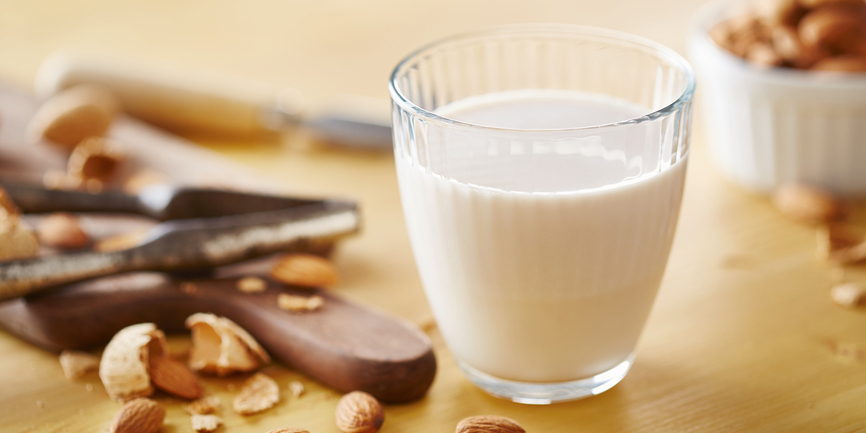
UP TO 40% OFF SITEWIDE






Is Milk Or Almond Milk Better For Diabetics?


Table of Contents
- The Nutritional Profile of Milk
- Benefits of Milk:
- Drawbacks of Milk:
- Evidence based studies:
- The Nutritional Profile of Almond Milk
- Benefits of Almond Milk:
- Drawbacks of Almond Milk:
- Evidence based studies:
- The Role of Dairy in the Diabetic Diet
- Studies on the impact of dairy consumption on Diabetes Management:
- SugarMD Advance Glucose Support
- Direct Comparison: Milk vs Almond Milk
- Effects on Blood Sugar Levels and Overall Health in Diabetics
- Studies Comparing Milk and Almond Milk:
- Other Factors to Consider
- Exploring Other Milk Alternatives
- What do studies say?
- Conclusion
- About The Author
Diabetes is a disorder that may impact how your body processes glucose (blood sugar). There are two basic varieties of this chronic disease: types 1 and 2. In type 1 diabetes, your body can't produce enough insulin. Whereas in type 2 diabetes, your body struggles to use insulin. Insulin is a hormone that helps keep blood sugar levels in check. Thus, it is an important part of treating diabetes. When it comes to managing diabetes, diet is crucial.
Eating the right things and at times, can make a huge difference. The National Institute of Diabetes and Digestive and Kidney Diseases states that eating the right food is important for controlling diabetes. Also, it will help you keep your weight and blood sugar at good levels. To avoid the added carbs and calories in fried fish, the American Diabetes Association advises choosing grilled fish. Besides, experts recommend reducing the consumption of foods that have a high glycemic index (GI).
And eating foods that are rich in protein or healthy fats. This can help to mitigate their impact on blood sugar levels and promote satiety for long period of time. White bread, white rice, and sugary drinks are foods with a high GI index. Fruits, vegetables, whole grains, lean meats, and healthy fats are nutrient-dense foods are ideal for people with diabetes. Here, we'll look at the nutritional advantages of both forms of milk for people with diabetes.
It reviews each type of milk's benefits, drawbacks, and potential effects. Although milk is a rich source of calcium and protein, it can also be high in calories and fat. On the other hand, almond milk has a low calorie and fat content. It is a great option for people trying to lose or maintain weight. It's crucial to remember that almond milk is low in protein. Thus, obtaining protein from other sources is important. Almond milk from some brands could include extra sugars. Thus, you need to be cautious about it.
The Nutritional Profile of Milk
Humans have been drinking milk as a staple diet for many centuries. It is a complex food that has several essential nutrients for our health. Milk offers a range of nutritional components. So, helps in promoting health and wellness in individuals.
Benefits of Milk:
- Milk contains protein, which is crucial for preserving muscle mass and encouraging satiety. Dairy products like milk also contain calcium.
- Calcium is good for bones and may help control blood sugar levels.
Drawbacks of Milk:
For people with diabetes, milk may also pose possible drawbacks.
- Some milk varieties may contain more calories and fat.
- It can cause weight gain and insulin resistance.
- Also, milk contains lactose, a sugar that can raise blood sugar levels in people with diabetes.
Evidence based studies:
- Despite these side effects, there is evidence that drinking milk in moderation is not bad. A study published in the Journal of Dairy Science discovered that drinking low-fat milk reduced the chances of type 2 diabetes.
- Consuming dairy products, lowers the chance of developing metabolic syndrome. It is a disorder that raises the risk of heart disease and diabetes. Stated in study published in a American Journal of Clinical Nutrition.
- It's important to note that not all research has linked milk consumption to a lower chance of developing diabetes. A study in the Journal of Nutrition indicated that consuming whole milk and other high-fat dairy products increased the risk of type 2 diabetes.
In conclusion, milk has a detailed nutritional profile. But it has possible advantages and disadvantages for diabetes. Milk contains lactose, which can cause blood sugar to rise. Dairy milk is an excellent source of calcium and protein, but it can also be rich in fat and calories. People with diabetes may enjoy consuming low-fat milk and other dairy products. To understand the relationship between milk consumption and the risk of getting diabetes, more research is necessary.
The Nutritional Profile of Almond Milk
Recently, almond milk has gained popularity as a dairy milk substitute for a valid reason. It has limited calories, lots of good fats, and neither lactose nor cholesterol. But, what about it’s nutritional contents for people with diabetes?
Benefits of Almond Milk:
- Almond milk has a low carbohydrate content, making it a good choice for people with diabetes. In contrast to cow's milk's 12 grammes of carbs, unsweetened almond milk has only 1-2 grammes per cup.
- Almond milk also contains a lot of monounsaturated and polyunsaturated fats. It help people with diabetes in controlling their blood sugar levels.
Drawbacks of Almond Milk:
- But, certain almond milk products may have added sugars or sweeteners. It can increase carbohydrate content and raising blood sugar levels. People with dould carefully read labels and prefer unsweetened types.
Evidence based studies:
- Almond milk may also be beneficial to diabetics, according to research. According to research published in the Journal of Diabetes Research, drinking almond milk for 12 weeks enhanced insulin sensitivity and decreased fasting blood sugar levels in people with type 2 diabetes.
- According to other research in the Journal of Nutrition and Metabolism, people with type 2 diabetes who are overweight or obese and drink almond milk as part of a low-carb diet have better glycemic control.
If people with diabetes pick unsweetened types and monitor their blood sugar levels, almond milk may be a healthy alternative to their diet. It is a great substitute for dairy milk due to its high healthy fat content and low carbohydrate level. Before making any big dietary changes, speaking with a medical practitioner is crucial.
The Role of Dairy in the Diabetic Diet
For people with diabetes, dairy products can be a significant part of their diet. They are a rich source of protein, which can aid in controlling blood sugar levels and fostering feelings of fullness. They also include calcium, which is crucial for supporting bone health. Probiotics are another ingredient found in several dairy products, including yogurt, and they can aid in reducing inflammation and improving gut health.
However, people with diabetes must choose low-fat dairy items because full-fat milk and cheese, might contain a lot of saturated fat. It can raise the risk of heart disease and other health issues. People with diabetes should also be aware of the number of carbohydrates in dairy products. Most of them, including flavored yogurts and sweetened milk, may have a lot of added sugar. People with diabetes should consult a healthcare provider. He or she can help to discover the best solutions for their needs.
Studies on the impact of dairy consumption on Diabetes Management:
Many studies look at the impact of dairy consumption on the management of diabetes. Here are a few examples:
- According to a study published in the American Journal of Clinical Nutrition, women who consume low-fat dairy products have a lower chance of developing type 2 diabetes. According to a 14-year study that included over 82,000 women, those who consumed the most low-fat dairy products had a 12% reduced risk of type 2 diabetes, than those who consumed fewer dairy products.
- Another study published in the Journal of Nutrition discovered that type 2 diabetics who were overweight or obese and consumed dairy products had better insulin sensitivity. The 12-week study of 36 participants indicated that those who ate dairy products had better insulin sensitivity than those who avoided dairy products.
- Higher intake of all dairy products can lower risk of type 2 diabetes, according to a meta-analysis of 14 cohort studies published in the American Journal of Clinical Nutrition. According to the study, the risk of type 2 diabetes decreased by 7% for every daily increase in dairy consumption of 200 grams.
These studies suggest that eating low-fat dairy products may help control diabetes, primarily by increasing insulin sensitivity and lowering the risk of type 2 diabetes. However, it's crucial to pick low-fat foods and monitor your sugar and carbohydrate intake. For many years, people have debated the pros and cons of milk vs almond milk. People with diabetes should take particular note of this dispute.
Almond milk is high in healthy fats and low in carbs, whereas dairy milk has more calcium and protein. The issue of milk vs. almond milk is intricate and multifaceted and could impact the dairy sector, the environment, and personal health. People with diabetes should select low-fat dairy items and unsweetened almond milk, and they should think about the possible effects of their decision on their health and the environment.
SugarMD Advance Glucose Support
Maintaining healthy blood sugar levels can be a challenge. From carby meals to snacks and even with all the effort, it’s still not enough. That’s where SugarMD Advanced Glucose Support comes in. Our blend of traditional Ayurvedic herbs helps regulate blood sugar levels, curbs cravings, supports weight loss, boosts metabolism and energy. Endorsed by endocrinologists, this unique formula of pure, potent herbs promotes overall blood sugar health. Ideal for both pre-diabetics and Type 2 diabetics.
Direct Comparison: Milk vs Almond Milk
- Two widely consumed beverages milk, and almond milk have their nutritional profiles compared. Milk is a dairy product high in calcium, vitamin D, and protein. Other vitamins and minerals, including vitamin B12, riboflavin, and phosphorus, are abundant. However, milk may also contain significant amounts of saturated fat, which raises the risk of heart disease and other illnesses.
- On the other hand, almond milk is a plant-based milk substitute with few calories and carbs. Additionally, it has a lot of heart-healthy fats like monounsaturated and polyunsaturated fats, which can aid in lowering inflammation. Vitamin E, an antioxidant that can help prevent cell damage, is abundant in almond milk.
- It's crucial to remember that milk and almond milk have different nutrient contents when contrasting their nutritional profiles. For instance, a cup of whole milk has roughly 150 calories, 8 grams of fat, 12 grams of carbs, and 8 grams of protein. Comparatively, a cup of unsweetened almond milk has 30–40 calories, 2.5–2–grams of fat, 1–2–grams of carbs, and 1–gram of protein.
- Almond milk is a wonderful choice for people controlling their calorie and carb intake because it is lower in calories and carbohydrates than milk, which is a good source of protein and calcium. Almond milk is not an excellent source of protein, and individuals who don't eat other calcium-rich foods may not get enough calcium from it, so it's crucial to keep that in mind.
Effects on Blood Sugar Levels and Overall Health in Diabetics
Considerations such as how milk and almond milk affect blood sugar levels and general health are crucial for people with diabetes. Lactose, a kind of sugar in milk, can increase blood sugar levels. Milk's protein and fat, on the other hand, may aid in reducing the rate at which sugar enters the bloodstream and so help to prevent blood sugar increases.
On the other hand, almond milk is low in sugar and carbs, making it a smart choice for people with diabetes who need to monitor their blood sugar levels. Don't use sweetened almond milk. As sweetened types may include a lot of extra sugar. Both milk and almond milk are important in a balanced diet for people with diabetes. Protein and calcium, essential for supporting bone health and controlling blood sugar levels. It is crucial to pick low-fat solutions to limit saturated fat intake.
Studies Comparing Milk and Almond Milk:
- Several studies have mentioned the comparison between the impact of milk and almond milk on blood sugar levels. A research in the Journal of Diabetes Research indicated that consumption of almond milk assists in blood sugar regulation in obese type 2 diabetics. People who drank almond milk had better insulin sensitivity. They had lower fasting blood sugar levels than people who drank dairy milk.
- A study published in the Journal of the Academy of Nutrition and Dietetics, drinking almond milk helps to lower cholesterol levels in overweight people. The study's results revealed that people who drank almond milk had lower LDL cholesterol levels. The "bad" cholesterol that raises the risk of heart disease.
It is important to remember that the scope of this research cannot apply to all groups. Additionally, more study needs to conduct on how milk and almond milk affect blood sugar levels.
Other Factors to Consider
It is essential to consider each person's dietary requirements and preferences, particularly when managing diabetes. Each person with diabetes is different. While creating a nutrition plan, it is important to consider their requirements and preferences. What foods and eating habits are optimal for a particular person might depend on various factors. It includes lifestyle, socioeconomic status, cultural background, and motivation.
An individual with diabetes is more likely to follow a nutrition plan that suits best to their needs. Although nutrition is significant in managing diabetes, it is not the sole. Stress management, physical activity, and sleep are other lifestyle factors has great affect on blood sugar levels. Stress-reduction strategies like meditation or deep breathing can assist in reducing cortisol levels and improving blood sugar regulation. Regular exercise can help enhance insulin sensitivity and lower blood sugar levels. Sleep is important.
Since, lack of sleep can result in insulin resistance and higher blood sugar levels. Fixing these issues can have a great impact on overall health. When changing diet plan, you must consult your dietitician. Such experts can offer individualized nutrition guidance. They help in creating a nutrition plan that suits the person's health condition. They can advise on portion control or carbohydrate tracking. You can achieve better health outcomes from their assistance.
Exploring Other Milk Alternatives
Several popular milk substitutes are available besides almond and dairy milk. For example, soy and oat milk. Soybean milk has a creamy consistency and a nutty flavor. Oats has a mild, somewhat sweet flavor. In many recipes, soy milk and oat milk are great alternative milk. They are both widely available at grocery shops.
Oat and soy milk are suitable replacements for dairy milk for people with diabetes. Since soy milk has a low glycemic index and is common in carbohydrates, it doesn't increase blood sugar levels sharply. Oat milk is a wonderful choice for people with diabetes because it is low in carbohydrates and has a moderate glycemic index. It's vital to check the labels carefully and choose unsweetened soy and oat milk variants because certain brands may include additional sugars.
What do studies say?
Soy milk may have some disadvantages because it contains phytoestrogens, which are plant substances that can imitate estrogen's physiological effects. While some studies have indicated that these substances might be healthy, others have raised questions about their potential effects on hormone levels. However, the side effects are not clear, that suggests the conduction of more studies. Few studies have evaluated various milk substitutes’ nutrient profiles and health benefits.
- A study examined the nutritional value and health advantages of soy, almond, and cow's milk in children. Stated by the Journal of the Academy of Nutrition and Dietetics. The researchers discovered that while almond milk had lower quantities of these nutrients. The soy and cow's milk were excellent sources of calcium and protein.
Overall, more research might examine the health effects of soy and oat milk. even if they may have some potential advantages and disadvantages for diabetes. Diabetics should consult a healthcare professional to identify the best milk substitute for their circumstances.
Conclusion
To conclude, we have discovered the benefits and drawbacks of milk and almond milk for diabetics. In addition to being a good source of calcium and protein, milk can also be high in calories, fat, and lactose, which can cause blood sugar levels to rise. Almond milk, on the other hand, is a fantastic choice for individuals seeking to lose or maintain weight because of its low calorie and fat content. Almond milk, however, can include added sugars that can raise blood sugar levels in some types.
We have looked at various milk substitutes, including soy and oat milk, which can work as dairy milk substitutes for diabetics. However, it varies from person to person. Different individuals have different health conditions. Therefore, it’s best to listen to your body and fulfill its requirements with great care. Managing blood sugar levels and maintaining overall health is possible for people with diabetes through personalized food planning.
Although you can include milk and almond milk in a balanced diet for diabetic. It is important to take into account each person's dietary demands and preferences. There are lots of certified dieticians available. Individuals with diabetes can develop a customized meal plan that suits their lifestyle and satisfies their nutritional needs.
Take care of your health by making healthy choices for the betterment of your health and your family. Good health is a blessing; don’t let diabetes ruin that for you. Let’s get out of the comfort zone for a better future together. To guarantee the best possible health outcomes, we urge you to speak with healthcare experts.
About The Author
Meet Dr. Ahmet Ergin a highly skilled and dedicated endocrinologist with a passion for diabetes care. Dr. Ergin earned his medical degree with honors from Marmara University in Istanbul. He completed internal medicine residency and endocrinology fellowship at Cleveland Clinic.
Dr. Ergin is board-certified in Internal Medicine, Endocrinology, Diabetes, and Metabolism due to his vast medical expertise. He's a certified diabetes educator, author of "The Ultimate Diabetes Book," and founder of "the SugarMD YouTube channel." Dr. Ergin offers exceptional diabetes care to his patients in Port Saint Lucie, FL, helping them manage effectively.
Disclaimer: These statements have not been evaluated by the Food and Drug Administration. Information on this website isn’t intended to treat, cure or prevent any disease. Discuss with your doctor and do not self-treat.
Written By Dr. Ahmet Ergin
465 total articles
Meet Dr. Ahmet Ergin, a highly skilled and dedicated endocrinologist with a passion for diabetes care. Dr. Ergin earned his medical degree with honors from Marmara University in Istanbul. He completed internal medicine residency and endocrinology fellowship at Cleveland Clinic. Dr. Ergin is board-certified in Internal Medicine, Endocrinology, Diabetes, and Metabolism due to his vast medical expertise. He's a certified diabetes educator, author of “The Ultimate Diabetes Book,” and founder of “the SugarMD YouTube channel.” Dr. Ergin offers exceptional diabetes care to his patients in Port Saint Lucie, FL, helping them manage effectively. For a closer look into his insights and experiences, connect with Dr. Ahmet Ergin on LinkedIn, Instagram, and YouTube.”
Disclaimer: These statements have not been evaluated by the Food and Drug Administration. Information on this website isn't intended to treat, cure or prevent any disease. Discuss with your doctor and do not self-treat.
Products













